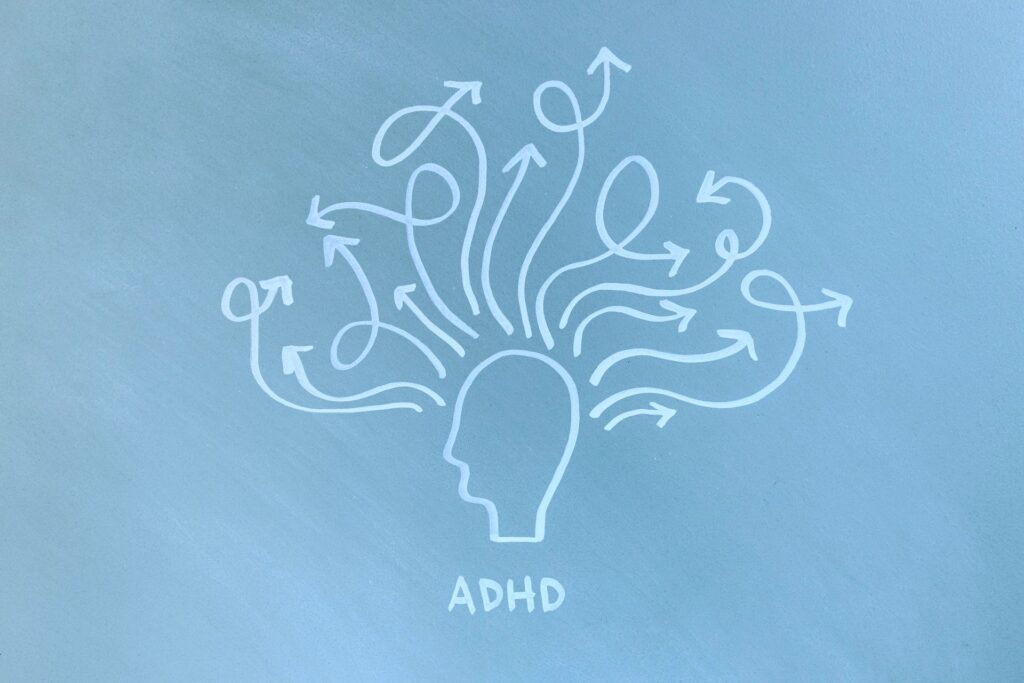Do you find it challenging to focus on tasks, frequently fidget, and leave a trail of unfinished projects? If so, you may not be lazy or disorganized – you might be dealing with ADHD.
Attention Deficit Hyperactivity Disorder (ADHD) is a neurobehavioral developmental disorder characterized by symptoms of inattention, hyperactivity, and impulsivity, typically manifesting before the age of 7 and potentially persisting into adulthood. But is there a way to manage it? Fortunately, the answer is yes. In the following article, we explore the world of ADHD, including its various types and symptoms, as well as diagnosis and treatment options.


According to DSM5-TR, ADHD is a neurodevelopmental disorder which impacts the way a person's brain develops and functions, particularly in areas related to attention, impulse control, and activity levels. In fact, there's a slight imbalance of certain chemicals, like dopamine and norepinephrine, that are crucial for focus and attention.
It is not a matter of laziness or lack of intelligence. Many people with ADHD are incredibly bright and creative. It is just that their brains are wired a bit differently. Notice that ADHD is typically diagnosed in childhood, but its symptoms can persist into adulthood.
According to the Canadian ADHD Resource Alliance (CADDRA), the prevalence of ADHD in Canada is estimated to be around 5-9% in children and adolescents, and about 4-5% in adults. But there is something to consider: many cases of ADHD go undiagnosed, especially in adults.
According to the Canadian ADHD Resource Alliance (CADDRA), the prevalence of ADHD in Canada is estimated to be around 5-9% in children and adolescents, and about 4-5% in adults. But there is something to consider: many cases of ADHD go undiagnosed, especially in adults.

There are three main types of ADHD, each with its own set of characteristics:
People with this type might seem spacey or easily distracted.
These people are always on the go, have trouble sitting still, and might say answers before the question is even finished.
As the name suggests, this is a mix of both inattentive and hyperactive-impulsive symptoms.
ADHD symptoms can be subtle and often overlap with other conditions. But here are some common signs:
Remember, everyone might experience these symptoms from time to time. The key difference with ADHD is that these symptoms are continuous, have been present for at least six months, and impact daily life and development. But It is not easy to see these signs in yours alone, you need someone who is a professional ADHD psychologist at diagnosis through an ADHD evaluation. At Different Clinic, we offer comprehensive ADHD evaluations and diagnoses.
Now, you might be wondering, "What causes ADHD anyway?" In fact, the truth is, It is a complex interplay of various factors:
ADHD has a high heritability rate, with estimates suggesting that up to 74% of the risk can be attributed to genetic factors. ADHD often runs in families, indicating a significant genetic component. If your parents or siblings have ADHD, you are more likely to have it as well. Just as you might inherit your mother’s nose or your father’s sense of humor, you may also inherit a distinctive brain wiring associated with ADHD.
Disruptions in various neuronal structures and pathways, including white matter disruptions in multiple cortical pathways, have been observed in individuals with ADHD. These disruptions affect cognitive and regulatory functions.
Studies have shown that people with ADHD may have differences in activity of their prefrontal cortex, particularly in areas responsible for attention and impulse control.
Psychological and social factors can also influence the manifestation of ADHD symptoms. Traumatic experiences, chronic stress, and family dynamics are known to impact the severity and persistence of ADHD. Emotional dysregulation and rejection sensitivity are common in individuals with ADHD, further complicating their social interactions and overall well-being.
It is important to note that the presence of these risk factors does not guarantee you will develop ADHD, nor does their absence ensure immunity from the condition. So, this is where the diagnosis comes into play.
As discussed earlier, diagnosing ADHD is not as simple as checking off a list of symptoms. It is a process that requires a thorough evaluation by a qualified healthcare professional.
Here, at Different Clinic, we offer you a comprehensive ADHD evaluation and you can read about it here.

ADHD Treatment varies from person to person. Here are the evidence-based treatments that we use in Different Clinic:
Living with ADHD, or supporting someone who does, can certainly have its challenges. But here's the thing – ADHD is not just about difficulties. Many people with ADHD are incredibly creative, energetic, and think outside the box. They often excel in fields that require quick thinking and adaptability. It is all about finding the right strategies to harness these strengths while managing the challenges.
If you are looking for an ADHD center and ADHD support, we are dedicated to assisting individuals and families in navigating the complexities of ADHD. We offer comprehensive assessments, personalized treatment plans, and continuous support. We are here for you.
4711 Yonge St., 10th Floor, Unit 10097, Toronto, ON M2N 6K8
Monday to Friday 8:00 AM to 8:00 PM / Weekends: Saturday from 10:00 AM to 6:00 PM.

